| Srl | Item |
| 1 |
|
| 2 |
ID:
114401


|
|
|
|
|
| Publication |
2012.
|
| Summary/Abstract |
This article derives from the author's experience in a senior Ministry of Defence posting from the beginning of 2006 to mid-2007, and it is therefore an insider's account based on personal observations and perceptions of the decision- and policy-making process in Whitehall at the time. Even today, after reform of these very processes, there are still pertinent lessons from the Helmand decision about structures and mindsets in Britain's strategic planning.
|
|
|
|
|
|
|
|
|
|
|
|
|
|
|
|
| 3 |
ID:
114397


|
|
|
|
|
| Publication |
2012.
|
| Summary/Abstract |
In this analysis of the recent debate on defence policy in Germany, Henrik Heidenkamp and Ferdi Akaltin highlight a growing re-evaluation of the German and European strategic environment, and a seeming willingness on the part of German policy-makers to identify a common European solution to the current defence-capabilities gap. After analysing why German politicians no longer seem to dismiss the idea of a common European army as the unrealisable dream of idealists, the authors present the difficult questions that German policy-makers, and their European allies, will need to confront should they wish to turn their ideas into concrete policy, and suggest ways in which such a project could be realised in the long term.
|
|
|
|
|
|
|
|
|
|
|
|
|
|
|
|
| 4 |
ID:
114402
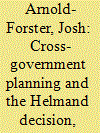

|
|
|
|
|
| Publication |
2012.
|
| Summary/Abstract |
In this account of the British decision to deploy to Helmand in 2006, Josh Arnold-Forster, at the time special adviser to the defence secretary, gives a personal assessment of the inner workings of the inter-departmental machine within which the government elaborated its Afghan policy.
|
|
|
|
|
|
|
|
|
|
|
|
|
|
|
|
| 5 |
ID:
114405
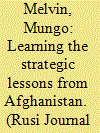

|
|
|
|
|
| Publication |
2012.
|
| Summary/Abstract |
Decisions surrounding Britain's involvement in Afghanistan continue to be the subject of heated debate among policy-making and military circles. Far from apportioning blame, argues Mungo Melvin, a constructive assessment of the decisions made on Afghanistan will provide useful lessons for the future of Britain's strategy-making.
|
|
|
|
|
|
|
|
|
|
|
|
|
|
|
|
| 6 |
ID:
114403


|
|
|
|
|
| Publication |
2012.
|
| Summary/Abstract |
The decision-making process leading to the Helmand deployment in 2006 was seriously flawed. Matt Cavanagh, special adviser to the government at the time, revisits the dynamics behind the ministers' failure to devise and maintain a successful strategy.
|
|
|
|
|
|
|
|
|
|
|
|
|
|
|
|
| 7 |
ID:
114407
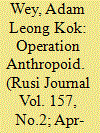

|
|
|
|
|
| Publication |
2012.
|
| Summary/Abstract |
In 1941, the very concept of a Czechoslovakian state was a parlous one: the provisions of the 1938 Munich Agreement, which had dismembered the pre-war state, had not yet been annulled. The position of the Czechoslovakian government-in-exile among the Allies was weak. The exiled president, Eduard Benes, therefore proposed a bold plan to assassinate a key Nazi leader and challenge a perception of Czech passivity under occupation. While the plan did succeed, it came at a terrible human cost. But, for Benes, it secured the pre-1938 borders of Czechoslovakia.
|
|
|
|
|
|
|
|
|
|
|
|
|
|
|
|
| 8 |
ID:
114399


|
|
|
|
|
| Publication |
2012.
|
| Summary/Abstract |
The London 2012 Olympics are the catalyst for a renewed effort to create an effective Public-Private Partnership in the provision of national security and resilience. Valentina Soria explores the public sector's concerted effort to engage businesses in the planning and delivery of security, and the positive long-lasting effects this may have on the UK's security culture.
|
|
|
|
|
|
|
|
|
|
|
|
|
|
|
|
| 9 |
ID:
114398
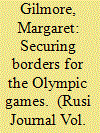

|
|
|
|
|
| Publication |
2012.
|
| Summary/Abstract |
The UK Border Agency, recently beleaguered with problems and criticisms over failures of immigration control, was split in two at the beginning of March, only months before the London 2012 Olympics. Margaret Gilmore explores how the Games present the newly separated UK Border Force with the most sophisticated and complex challenge to date.
|
|
|
|
|
|
|
|
|
|
|
|
|
|
|
|
| 10 |
ID:
114395
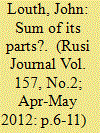

|
|
|
|
|
| Publication |
2012.
|
| Summary/Abstract |
'Partnership' and 'partnering' are concepts commonly applied to new initiatives between government and industry. But, as the state looks to improve delivery and value for money in procurement programmes, a simple label will not suffice. Partnership and partnering must truly reflect a collaborative set of working practices bridging the private and public sectors.
|
|
|
|
|
|
|
|
|
|
|
|
|
|
|
|
| 11 |
ID:
114396


|
|
|
|
|
| Publication |
2012.
|
| Summary/Abstract |
Sustainability is a key principle for the long-term future of defence procurement. Despite recent advancement and a recognition of its importance in the Strategic Defence and Security Review and the National Security Strategy, decisions on future military capabilities are likely to be dominated by short-term financial concerns. Clive Murgatroyd explores the risks of sidelining sustainability for the long-term relevance, affordability and resilience of the UK's military capabilities.
|
|
|
|
|
|
|
|
|
|
|
|
|
|
|
|
| 12 |
ID:
114406


|
|
|
|
|
| Publication |
2012.
|
| Summary/Abstract |
Do cyber-attacks constitute force? How should international law regulate cyber-activity? How does it affect the principle of non-intervention? In the absence of specific legal principles, can due diligence act as an appropriate framework? In this prize-winning essay, Stephanie Meulenbelt explores the international legal conundrum posed by the rise of cyber-warfare.
|
|
|
|
|
|
|
|
|
|
|
|
|
|
|
|